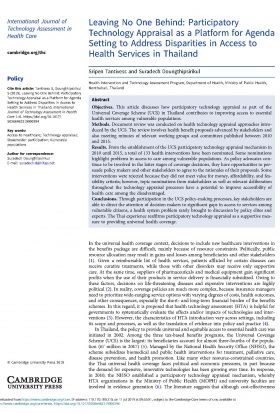This website uses cookies so that we can provide you with the best user experience possible. Cookie information is stored in your browser and performs functions such as recognising you when you return to our website and helping our team to understand which sections of the website you find most interesting and useful.
Leaving No One Behind: Participatory Technology Appraisal as a Platform for Agenda Setting to Address Disparities in Access to Health Services in Thailand.

รายละเอียดเพิ่มเติม
Abstract
OBJECTIVES:
This article discusses how participatory technology appraisal as part of the Universal Coverage Scheme (UCS) in Thailand contributes to improving access to essential health services among vulnerable populations.
METHODS:
Document review was conducted on health technology appraisal approaches introduced by the UCS. The review involves health benefit proposals advanced by stakeholders and also meeting minutes of relevant working groups and committees published between 2010 and 2015.
RESULTS:
From the establishment of the UCS participatory technology appraisal mechanism in 2010 until 2015, a total of 133 health interventions have been nominated. Some nominations highlight problems in access to care among vulnerable populations. As policy advocates continue to be involved in the latter stages of coverage decisions, they have opportunities to persuade policy makers and other stakeholders to agree to the rationales of their proposals. Some interventions were rejected because they did not meet value for money, affordability, and feasibility criteria; however, topic nominations from stakeholders as well as relevant deliberation throughout the technology appraisal processes have a potential to improve accessibility of health care among the disadvantaged.
CONCLUSIONS:
Through participation in the UCS policy-making processes, key stakeholders are able to direct the attention of decision makers to significant gaps in access to services among vulnerable citizens, a health system problem rarely brought to discussion by policy elites and experts. The Thai experience reaffirms participatory technology appraisal as a supportive measure to providing universal health coverage.
KEYWORDS:
Access to healthcare; Stakeholder participation; Technology appraisal; Vulnerable populations
Click here to access the publication: https://www.ncbi.nlm.nih.gov/pubmed/31292013




